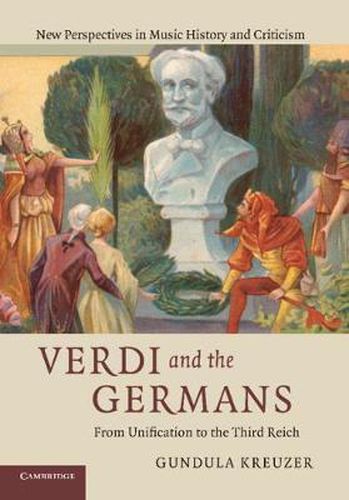Readings Newsletter
Become a Readings Member to make your shopping experience even easier.
Sign in or sign up for free!
You’re not far away from qualifying for FREE standard shipping within Australia
You’ve qualified for FREE standard shipping within Australia
The cart is loading…






This seminal study of Giuseppe Verdi’s German-language reception provides important new perspectives on German musical culture and nationalism from the mid-nineteenth century onwards. Kreuzer argues that the concept of Germany’s musical supremacy, so dear to its nationalist cause, was continually challenged by the popularity of Italian opera, a genre increasingly epitomised by Verdi. The book traces the many facets of this Italian-German opposition in the context of intense historical developments from German unification in 1871 to the end of World War II and beyond. Drawing on an exceptionally broad range of sources, Kreuzer explores the construction of visual and biographical images of Verdi; the marketing, interpretation and adaptation of individual works; regional, social and religious undercurrents in German musical life; and overt political appropriations. Suppressed, manipulated and, not least, guiltily enjoyed, Verdi emerges as a powerful influence on German intellectuals’ ideas about their collective identity and Germany’s paradigmatic musical Other.
$9.00 standard shipping within Australia
FREE standard shipping within Australia for orders over $100.00
Express & International shipping calculated at checkout
This seminal study of Giuseppe Verdi’s German-language reception provides important new perspectives on German musical culture and nationalism from the mid-nineteenth century onwards. Kreuzer argues that the concept of Germany’s musical supremacy, so dear to its nationalist cause, was continually challenged by the popularity of Italian opera, a genre increasingly epitomised by Verdi. The book traces the many facets of this Italian-German opposition in the context of intense historical developments from German unification in 1871 to the end of World War II and beyond. Drawing on an exceptionally broad range of sources, Kreuzer explores the construction of visual and biographical images of Verdi; the marketing, interpretation and adaptation of individual works; regional, social and religious undercurrents in German musical life; and overt political appropriations. Suppressed, manipulated and, not least, guiltily enjoyed, Verdi emerges as a powerful influence on German intellectuals’ ideas about their collective identity and Germany’s paradigmatic musical Other.